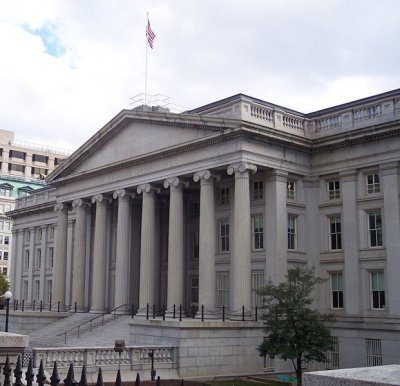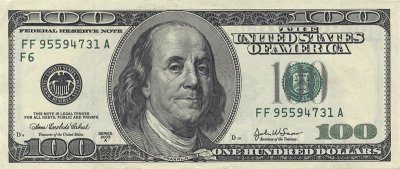| < | Wavepacket Blog |
> |
| << Newer entries << | |
| 2008 | |
| October | |
| Sat Oct 4 21:32:25 2008 Congress says Yes |
|
| September | |
| Mon Sep 29 21:17:40 2008 Just say No |
|
| Thu Sep 25 22:35:27 2008 Open Letter |
|
| >> Older entries >> | |
| >> links >> | |
| Sat Oct 4 21:32:25 2008 Congress says Yes The $700B bailout is now law. |
|
| In
Just say No, I celebrated that Congress had not passed the
Emergency Economic Stabilization Act. In my view, that would be money spent on Wall Street financiers without
clear benefit for US taxpayers.
However, the House and Senate have now approved an amended version of the Act, and Bush signed it into law on Friday. So now $700B of our money will be given to Wall Street. I am disappointed! I do feel that this will save mostly the wealthy investment banks, based on a sense of panic. I know credit markets tightened, but was this the only way to loosen them? Well, it is sad, but at this point it is now up to the Treasury and the Federal Reserve to implement the plan wisely. [As an aside: I did receive a nice form letter from Senator Murray as a response to my open letter. And I'm not being facetious--I'm sure it was actually a lot of work to properly respond to everyone that contacted her, even with a form letter.] With luck, the people holding the purse strings will be able to keep the money from flowing into doomed investment instruments. We will know in a few years! Comments |
Related: economics Unrelated: books energy environment geopolitics lists mathematics predictions science |
| Mon Sep 29 21:17:40 2008 Just say No Congress shuts down the bailout. |
|
| Well, Congress
said no today. I'd like to think it was my aggressive blogging that helped stop the
bill's passage.
On the one hand, I think we can breathe a sigh of relief. This was a bill desperately wanted by financial institutions so they could cap their losses and dodge responsibility for their poor risk management. I still believe that the clamor of Wall Street was ringing more in the ears of Bernanke and Paulson than Main Street. This means that, if needed, that $700B can be used to help stave off a recession in other, more practical ways. On the other hand, now what? The markets didn't like the news, of course. The Dow Jones Industrial Index dropped 777 points, which, as every reporter noted, was "the largest single-day point loss in history." Interestingly, that means it wasn't the largest percentage drop. The 777 drop was 6.8%, which wasn't really close to the Black Monday (1987) drop of over 22%. Weird that they didn't mention that today's drop was less than a third as bad as Black Monday! But of course that doesn't sell newspapers. And the economic news wasn't all bad. Oil posted a large price drop, now down to a price of around $95 per barrel. Commodities holders are worried that lower demand will keep prices down. Of course, consumers of commodities are in better shape! Not that I'm getting cocky. The economy is still in for a rough ride, and there could be further negative impacts ahead. Well, what will happen now? I'm guessing that not much will happen legislatively until after Election Day. Members of Congress will be far too worried about their jobs to take a chance on a very expensive bill. The political maneuvering was excellent. President Bush proposed it, argued for it, and lost. So now he can claim a recession isn't his fault. Senators McCain and Obama did the same thing. However, we are still left holding the bag, and the government will have to step in to help keep things from collapsing. Here are my predictions:
A 6 month recession isn't bad! I am gambling that the subprime mortgage crisis has not infected the majority of commercial banks, so the banking system as a whole will keep going. And I'm guessing that the consumer slowdown, which has already started, will continue for just a bit more. But the bottom will be reached as those firms who still have assets are able to capitalize on the situation, and risk-takers will take advantage of cheaper credit and lower prices. Comments |
Related: economics predictions Unrelated: books energy environment geopolitics lists mathematics science |
| Thu Sep 25 22:35:27 2008 Open Letter Open Letter to my Representative and Senators |
|
| Open letter to my US Representative (Jim McDermott) and US Senators (Maria
Cantwell and Patty Murray)
Dear Senator Murray, Senator Cantwell, Representative McDermott: Please do not approve the administration's proposed $700 billion bailout plan! I know you care deeply about the health of the nation's economy, and the impact on local businesses. And I am sure we would all gladly pay now to prevent a damaging recession or depression later. However, the Administration's proposal does not guarantee the future health of the economy. At best, it may prop up some failing investment banks a little bit longer. At worst, it will reward those institutions that took inappropriate risks with their investor's money. And it will tie up funds that could be used to fight a recession or depression more effectively. Most importantly, there is no clear reason why this large sum of money should be spent or allocated now. The proposal is right to focus on subprime mortgage instruments as a key factor in the current crisis among investment banks. Those instruments will probably continue to lose value over the next year, as more mortgage holders default, and investors decline to purchase them. However, that decline is not likely to be stopped by the Administration's plan. Instead, the result will be a lot of taxpayer money spent on instruments that will continue their collapse. Also, the impact beyond overly-leveraged investment banks is not clear. Many parts of the national and world economy are more healthy, including commercial banks.
There are measures that could be taken to improve the health of the economy!
But whatever you decide to do, please do not vote for the Administration's plan! It is only likely to reward those who took inappropriate risks, and will not prevent a recession if one is truly coming. Comments |
Related: economics Unrelated: books energy environment geopolitics lists mathematics predictions science |
| Links: |  |
Blog Directory | Blog Blog | Technorati Profile | Strange Attractor |

